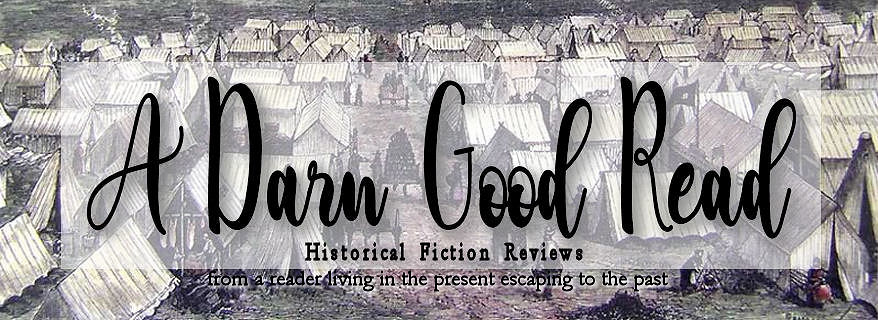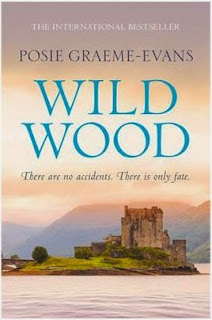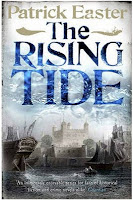Jessie Marley learns she is adopted and leaves Australia to seek out her birth mother in England. In London, distracted by what she has discovered, Jessie steps into the road and is involved in an accident that puts her in hospital with concussion and a shoulder injury.
Unable to speak or use her right hand, Jessie clumsily communicates with pencil and paper using her left. Not an artist, Jessie is mystified when she begins to draw pictures of a place and people she has no memory of, made even more suprising by the fact that she is doing it left-handed.
Rory Brandon, her neurologist, believes Jessie's new found abilities are the result of her head trauma. When he recognizes one of her drawings as the place where he grew up, he suggests Jesse go there with him to recuperate and assist in his research. Reluctantly Jesse agrees.
At the centre of this dual time frame narrative is Hundredfield, a castle in the Scottish borderlands. In the 14th century it is the medieval power base of the de Dieudonné family; in the 20th century it is a rundown estate desperately in need of money and the home of Alicia Donne.
The 14th century story opens with Maugris and Bayard de Dieudonné returning to Hundredfield to find their brother Godefroi has married the mysterious Lady Flore, who does not speak and is viewed with suspicion by the people. In their absence, Godefroi has also become a brutal overlord and has allowed conditions at Hundredfield to deteriorate to the point where its people are starving and some are deserting the castle to join a band of brigands in the forest.
Bayard de Dieudonné, the youngest and most likeable of the three brothers, is sensitive to the Lady Flore. To him, she is an enigma, but deserving of respect as his brother's wife. When Hundredfield comes under attack and Bayard must defend his family, he becomes privy to an ancient secret concerning the Lady of the Forest.
Through hypnosis Jesse is pulled further into the past and when Hundredfield is in danger of being lost again centuries later, she realises that she has been given the means to save it.
I'm a fan of dual time frame novels and I wasn't disappointed by this one from Posie Graeme-Evans. The time frames are clearly defined by being written in different points of view. The 20th century part in the third person; the 14th century part in the first, from the perspective of Bayard de Dieudonné.
Both stories held my interest, though I preferred medieval Hundredfield, where the action was more dramatic. Understandably so, as it was shrouded in myth, superstition and supernatural occurrences. I was also enthralled by Bayard's character: a medieval warrior with empathy for the common folk.
There is no doubt that the setting of this novel helps evoke the sense of mystery and myth. The cover image also drew me to this story. It's easy to imagine the events at Hundredfield taking place in such a wild and beautiful area. However, what kept me reading was the ease in which Posie Graeme-Evans built her story, slipping in tantalising clues along the way, until skilfully uniting past and present in the final scenes. The ending was very well done: family secrets, the circumstances of Jessie's birth and adoption, and what links the characters to Hundredfield are all explained by an unexpected revelation.
Wild Wood is an entertaining read and I enjoyed it immensely. I look forward to reading more by Posie Graeme-Evans.
Unable to speak or use her right hand, Jessie clumsily communicates with pencil and paper using her left. Not an artist, Jessie is mystified when she begins to draw pictures of a place and people she has no memory of, made even more suprising by the fact that she is doing it left-handed.
Rory Brandon, her neurologist, believes Jessie's new found abilities are the result of her head trauma. When he recognizes one of her drawings as the place where he grew up, he suggests Jesse go there with him to recuperate and assist in his research. Reluctantly Jesse agrees.
At the centre of this dual time frame narrative is Hundredfield, a castle in the Scottish borderlands. In the 14th century it is the medieval power base of the de Dieudonné family; in the 20th century it is a rundown estate desperately in need of money and the home of Alicia Donne.
The 14th century story opens with Maugris and Bayard de Dieudonné returning to Hundredfield to find their brother Godefroi has married the mysterious Lady Flore, who does not speak and is viewed with suspicion by the people. In their absence, Godefroi has also become a brutal overlord and has allowed conditions at Hundredfield to deteriorate to the point where its people are starving and some are deserting the castle to join a band of brigands in the forest.
Bayard de Dieudonné, the youngest and most likeable of the three brothers, is sensitive to the Lady Flore. To him, she is an enigma, but deserving of respect as his brother's wife. When Hundredfield comes under attack and Bayard must defend his family, he becomes privy to an ancient secret concerning the Lady of the Forest.
Through hypnosis Jesse is pulled further into the past and when Hundredfield is in danger of being lost again centuries later, she realises that she has been given the means to save it.
I'm a fan of dual time frame novels and I wasn't disappointed by this one from Posie Graeme-Evans. The time frames are clearly defined by being written in different points of view. The 20th century part in the third person; the 14th century part in the first, from the perspective of Bayard de Dieudonné.
Both stories held my interest, though I preferred medieval Hundredfield, where the action was more dramatic. Understandably so, as it was shrouded in myth, superstition and supernatural occurrences. I was also enthralled by Bayard's character: a medieval warrior with empathy for the common folk.
There is no doubt that the setting of this novel helps evoke the sense of mystery and myth. The cover image also drew me to this story. It's easy to imagine the events at Hundredfield taking place in such a wild and beautiful area. However, what kept me reading was the ease in which Posie Graeme-Evans built her story, slipping in tantalising clues along the way, until skilfully uniting past and present in the final scenes. The ending was very well done: family secrets, the circumstances of Jessie's birth and adoption, and what links the characters to Hundredfield are all explained by an unexpected revelation.
Wild Wood is an entertaining read and I enjoyed it immensely. I look forward to reading more by Posie Graeme-Evans.















